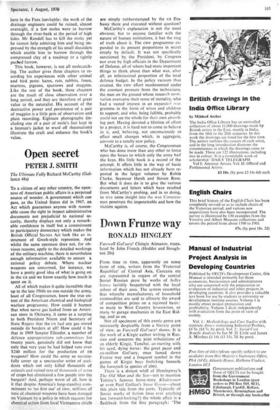Open secret
PETER J. SMITH
The Ultimate Folly Richard McCarthy (Gol- lancz 48s)
To a citizen of any other country, the open- ness of American public affairs is a perpetual source of wonder. A government which can pass, as the United States did in 1967, an Act which guarantees anyone with reason- able cause the right to inspect administrative documents not prejudicial to national se- curity, thereby displays not only a remark- able confidence in itself but a commitment to participatory democracy which makes the British Official Secrets Act look like an in- strument of Greek-style repression. And whilst the same openness does not, for ob- vious reasons, apply to the detailed workings of the military machine, there is nevertheless enough information available to ensure a rational policy debate. Where nuclear weapons are concerned, for instance, we have a pretty good idea of what is going on in the us and we know exactly how much is spent on it.
All of which makes it quite incredible that up to the late 1960s no one outside the army, least of all Congressmen, knew the true ex- tent of the American chemical and biological warfare programme. How could it happen that when nerve gas leaked from an Ameri- can store in Okinawa, it came as a surprise to both President Nixon and Secretary of State Rogers that the us had any gas stored outside its borders at all? How could it be that in 1969 Senator Ellender, a member of defence appropriations sub-committees for twenty years, genuinely did not know that only that very year he had helped vote over $240 million for the production of ca weapons? How could the army so success- fully cover up a spectacular series of acci- dents which not only killed thousands of animals and ruined tens of thousands of acres of crops but eliminated a few people into the bargain? And, perhaps worst of all, how is it that despite America's long-standing com- mitment to `no first use' of caw, millions of tons of chemical weapons have been dumped on Vietnam by a policy in which requests for chemical action from local Vietnamese chiefs
are simply rubberstamped by the us Em- bassy there and executed without question?
McCarthy's explanation is not the most obvious; but to anyone familiar with the nature of human institutions, it has the ring of truth about it. The caw programme ex- panded to its present proportions in secret simply by default. It was not specifically sanctioned by the President, by Congress nor even by high officials in the Department of Defense, all of whom had more important things to think about than what was, after all, an infinitesimal proportion of the total defence budget. In the policy vacuum thus created, the caw effort mushroomed under the constant pressure from the technicians, the men on the ground whose research moti- vation overcame their sense of morality, who had a vested interest in an expanded nro- gramme in the form of wives and children to support, and who, being fallible, probably could not see the whole for their own absorb- ing part. Having devoted a lifetime of effort to a project, it is hard not to come to believe in it, and, believing, not unconsciously to effect small changes which, in aggregate, amount to a totally new policy.
McCarthy is, of course, the Congressman who has done more than any other to force open the boxes to which only the army had the keys. His little book is a record of the attempt. It offers little in the way of basic information which has not already been re- ported in the larger volumes by Robin Clarke, Seymour Hersh and Steven Rose. But what it does do is to give the various documents and letters which have resulted from McCarthy's probing, and in so doing, to give some insight into the way Congress- men penetrate the impenetrable and how the victims squirm.






























 Previous page
Previous page